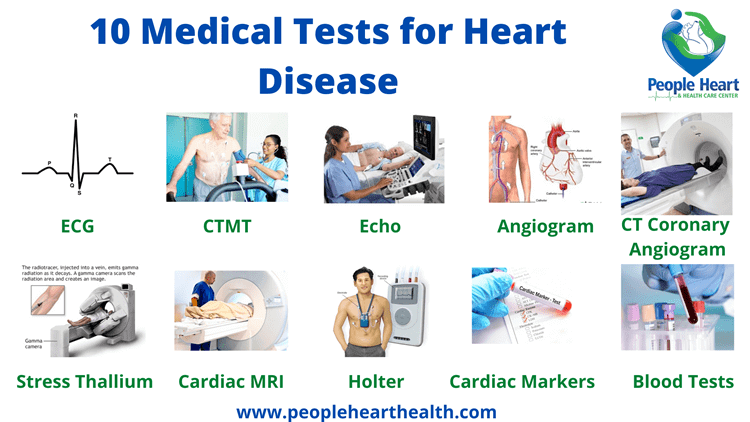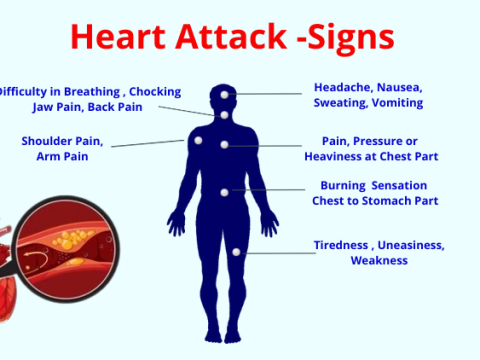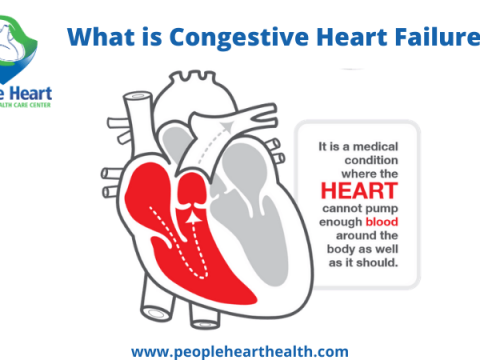
What is Silent Heart Attack, Causes and Prevention
February 26, 2021
Heart Attack Early Warning signs | Early Diagnosis for Best Treatment
April 18, 2022Here is a list for Common medical test to diagnose heart disease –
- ECG
- Treadmill Test / T.M.T. / C.T.M.T.
- 2-D Electrocardiogram
- Angiogram
- CT Coronary Angiogram / Coronary Computed Tomography Angiogram (CCTA)
- Nuclear Cardiac Stress Test / Thallium Scan
- Cardiac MR
- Holter Test
- Blood Tests
- Cardiac Markers Test
- ECG / Electrocardiogram – This is the primary test a doctor does when a patient comes to him with a complain of chest pain, heaviness, chest discomfort or spill in chest part or any other symptoms related to heart disease.
In an ECG test a patient lies on a bed, electrodes are placed around chest area and then Heart waves are monitored and recorded on a ECG Display machine, a printout is also taken of ECG.
Usually ECG Shows changes when patient is in pain condition and in other cases it usually comes normal. If ECG Shows changes then doctor’s advice for further investigation for heart.
2. Treadmill Test / Stress Test – In this test an ECG is being taken when a patient is doing an exercise. Doctor tells patient to walk on a treadmill machine while monitoring an ECG on the screen. Patient increases the walk speed as directed by the doctor. In a TMT test the effect of exercise is monitored on an ECG Pattern. If This test comes positive, then the chances of having heart blockage becomes very high.
3. 2-D Echocardiogram – This test is like a sonography of the heart, in which patients lies on a Bed and a specialist doctor does heart’s sonography with the help of probe, this test tells about heart valves, heart chambers, heart wall motion, heart’s pumping, heart function, heart’s effusion, vegetation, clot or cardiac masses etc.
4. Heart’s Angiogram – This test tells about heart blockages; in this test a catheter tube is inserted into an artery in your groin, arm or wrist. The catheter is moved up inside the artery until it reaches your heart. it is also a heart test for blockage.
Then a dye / contrast is injected to the heart arteries through the catheter and X-Ray images are taken then cardiologist doctor analyses the heart blockages, percentage of blockages, position of blockages, nature of blockage etc. it also tells about how well our heart is pumping.
5. CT Coronary Angiogram (CCTA) – This test in a minimal invasive test, in which a patient lies on CT machine table, A Contrast is injected through the IV injection, camera moves and takes different slices of heart and then specialist doctors analyses the slices and reports about blockages, nature, position etc.
6. Stress Thallium Scan / Nuclear Cardiac Scan – This test measures how much blood supply your heart is getting when it is at rest and when it is at stress, Stress thallium scan done in two parts one at rest and one at stress. A radioactive substance is injected into the blood stream and then images are being taken.
This test detects the blood flow in the whole heart (Myocardial perfusion), any supply defect, ventricles pumping, size of heart chambers, any diffused / scar area.
7. Cardiac MR – Patients who’s heart pumping is weak, who are not eligible for an angiography and stress thallium are advised by the doctors for an cardiac MRI.
A contrast is injected into your blood stream and with the help of machine doctors do the heart study. A cardiac MRI diagnoses Coronary Artery Disease, Cardiomyopathy, Congenital Heart Defects, Heart valves, Heart pumping, pericardial disease etc. It usually takes 30 minutes to 2 hours for this test.
8. Holter – This test is done to monitor electrical activity of the heart, ECG, pulse rate for 24 hours to 72 hours. This is ambulatory electrocardiography portable device which monitors patient’s ECG continuously helps in detecting arrhythmia, Irregular heartbeat and missing pulse.
9. Cardiac Markers Test – When doctor’s suspects that patient suffered a heart attack then cardiac enzymes tests – Trop-T, Trop-I and CPKMB will be done for confirmation of heart attack and measure the severity of a heart attack. These cardiac enzymes test are done by the patient’s blood sample
10. Blood tests – Simple blood tests Lipid Profile, HBA1c, CBC, LFT, RFT, are done at the primary level for health analysis of the patient. Lipid profile is the main indicator that tells about the cholesterol and triglyceride level in the blood
Written by: Dr. Chetan Sharma
EECP Specialist, Heart & Lifestyle Expert
Supported by Mr. Abhijeet Gautam





